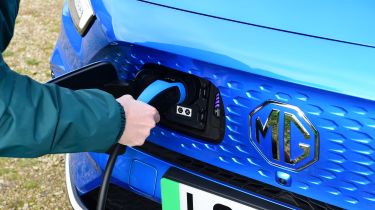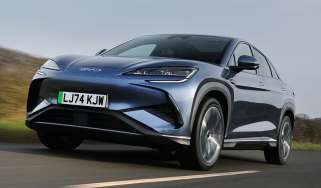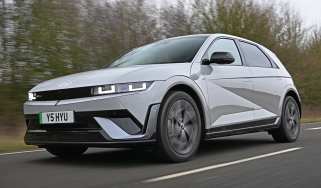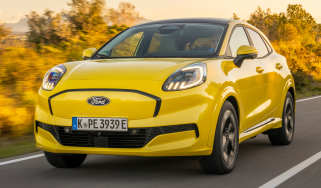How to buy an electric car
Electric cars are becoming more and more popular with new car buyers, and for good reason

Owning an electric car can result in huge savings on running costs if the technology suits your lifestyle, but it can be difficult to decide if making the switch is the best option. A hybrid, plug-in hybrid, petrol or diesel car could still be the best choice for you. There are a wide variety of EV options available, with the cheapest electric cars still offering impressive packages, albeit usually at the cost of driving range between charges.
You’ll be pleased to know that buying an electric car is a straightforward process which is very similar to buying any other type of car. You may need to arrange for a home wallbox charger to be installed, and get familiar with electric car charging stations, but you’ll also never need to visit a petrol station again. So, if you are wondering what is the best way to buy an electric car, and what are the best options, we’ve put together this guide to help you make the best decision.
How do I buy my first electric car?
 The 10 best electric cars in 2025
The 10 best electric cars in 2025
Although many of the internals of an electric car may be different to petrol and diesel-powered cars, buying an electric car is as straightforward as buying any other car. Many electric cars have expensive up-front costs because of their complex componentry, but you can get behind the wheel of an electric vehicle at an affordable price thanks to PCP finance.
As a result of their growing popularity with car buyers over the past few years, there are plenty of options when it comes to buying an electric car, and even used options represent good value for first-time buyers.
Previously, a government-funded grant helped to bring down the purchasing price of a new electric vehicle priced below £32,000. This incentivised many people to look at trading in their old car and buying new EVs, however this grant has now expired.
This shouldn’t stop you from considering an electric car as prices have been becoming more affordable with the introduction of more competition in the market and better finance deals as the market matures. Many family sized electric vehicles did not qualify for this grant anyway due to their high purchase prices so the loss of the grant will have a limited impact on buyers.
We have plenty of electric car reviews here on Carbuyer, so it's worth browsing through some of the best electric cars to find the perfect EV for you. Each electric car model offers unique features and equipment to suit a variety of lifestyles and different battery and motor choices for increased range and performance. We recommend doing some research to find the ideal electric car for your lifestyle before purchasing.
Is it worth buying an electric car?
There are pros and cons to owning an electric car that you should make yourself familiar with before making your decision. The greatest difference between a petrol or diesel engine car and an electric car is the electric motors and battery pack that take the place of the engine, gearbox, and fuel tank. Only a small number of electric vehicles utilise any type of gearing and electric vehicles deliver all of their pulling power instantly, meaning a more immediate response in acceleration.
There are other notable differences particularly in the mindset needed for an electric car's maintenance and charging. A good place to start is by understanding how long electric car batteries last so you are fully aware of what possible further costs you may incur in keeping a battery pack in top condition. In most cases, electric cars come with a long battery warranty and batteries should last for the average life of the car.
An electric car's battery can take a while to recharge fully compared to topping up the fuel of an engine-powered vehicle, so most EV owners take advantage of overnight charging to minimise any disruption. Charging an electric car overnight can also help reduce charging costs, because electricity tends to be cheaper during the night when demand is lower – however you’ll need to be with a supplier that has an ‘off peak’ tariff.
If you need to charge your electric car away from home, there are an increasing number of electric car chargers being installed around cities and at fuel stations where you can recharge your vehicle. The power output of these chargers tends to vary widely, so you will find some that can speedily recharge the battery of the latest EVs to near-total capacity in less than 30 minutes. Others can take a few hours.
Nearby chargers are listed on the sat-nav system of most electric cars alongside details on the charging speeds available, so it's worth planning ahead and scheduling time to charge your car's batteries at the fastest nearby chargepoint.
It can also be helpful to take advantage of charge points whenever they are available – outside a supermarket or office for example – because frequently stopping to add in a small amount of charge makes sense in the long run.
Which electric car should you buy?
There are a variety of electric cars available that will suit your lifestyle and driving habits. If you plan on driving long journeys with your electric car, it is worth trying to find a model with the longest range for your money. However, if you know you will only be covering short distances such as school runs, trips to the supermarket and the occasional trip to the office, then the maximum range may be of less concern to you. It is also worth taking a look at some of the cheapest electric cars, because these vehicles offer great value for money.
Contrary to popular belief, having an electric car with a massive range is not always the most necessary or sensible choice, because larger battery packs are expensive, heavy and require longer charging times to reach total capacity. Choosing an electric car with a smaller battery may save you money while still providing enough range to cover your daily activities and faster recharging times.
Other considerations when choosing an electric car include your budget, the technology and options available and the best deals available. It is always worth visiting a few different dealerships and looking at various electric cars to determine which one is best for you.
Why shouldn't you buy an electric car?
If you live in a particularly rural area and do not have a home charger, or find yourself making long distance journeys on a regular basis then the majority of electric cars may not suit your needs. Budget is also a factor in the decision to switch as although there are plenty of savings to be made running an electric car they currently command higher purchase prices than the equivalent petrol or diesel vehicle.
Electric cars can be less practical than diesel or petrol cars on long-distance drives because of their comparatively slow ‘refill’ times. However, it’s worth considering that EVs with the longest range, such as the Mercedes EQS, can cover more than 400 miles on a single charge, which means that long distance journeys will be less of a concern.
However, if you are a low-mileage driver with the facilities and space to charge an electric car overnight, you may be rewarded with cheaper running costs and a more environmentally friendly driving experience with an electric car.
Electric cars made simple
Recommended

New Subaru Solterra brings more range, power and polish
Most Popular

New Smart #5 Brabus is a 637bhp far cry from the brand’s city car past

Best car leasing deals 2025: this week’s top PCH offers
Tips & advice

Car dashboard warning lights: what does each symbol mean?

Electric car charging stations: public networks, charger types, apps and maps










